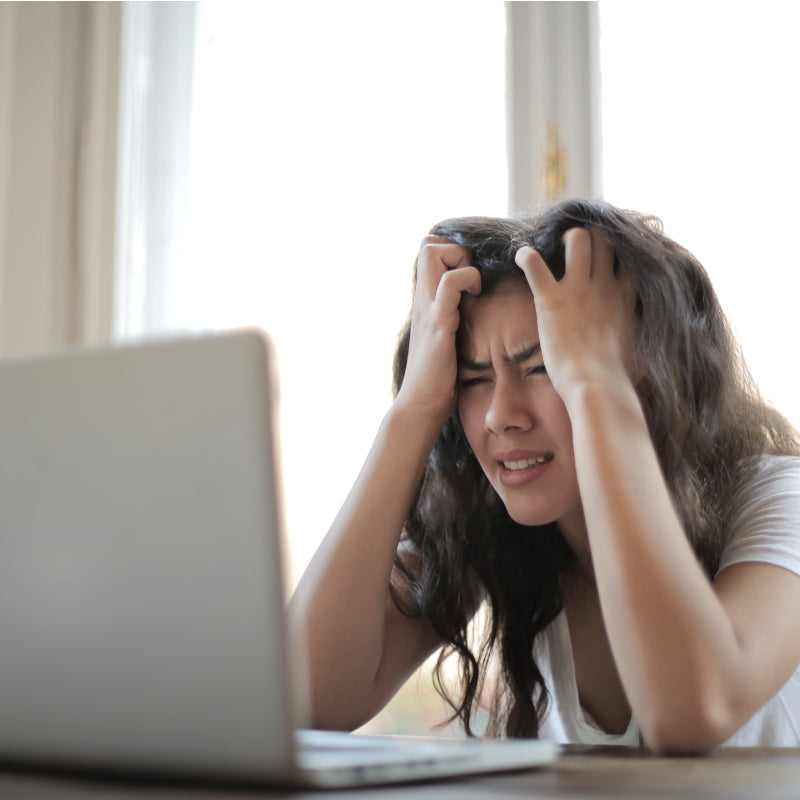Ever get that sinking feeling in the pit of your stomach at certain times of your monthly cycle? You are not alone. Anxiety before period is common, with up to 85% of women experiencing it at some point in their lives. In this article, we look at why this happens. Our team of experts are on hand to help you cope with your period anxiety.
Period Anxiety
We are all aware of the common signs that our period is on the way. There’s bloating, the cramps, the cravings for sugar… but, for many, that list of well-known symptoms also includes feelings of anxiety too.
Period anxiety (and anxiety before periods) is common but rarely talked about openly, and doctors aren’t really sure what causes it either. But the fact that it is so common doesn’t mean you need to just accept it and live with it. If the way you feel is affecting your everyday life or your ability to do your usual activities, it is always a good idea to seek professional help.
It also makes sense to try to gain a better understanding of what is happening and why, so that you can take steps to alleviate symptoms if you can.

Anxiety and Period
Although doctors can’t say for sure, it is thought that period anxiety is caused by the levels of hormones in the body rising and falling during your cycle. These peaks and dips affect neurotransmitters in your brain, messing with mood regulation and impacting on your emotional wellbeing.
And, if you already suffer with low mood, anxiety or depression, these symptoms are likely to intensify at certain points in your cycle too.
Dr. Ghazala Aziz-Scott, specialist in integrative women’s health and bioidentical hormone balancing at Marion Gluck Clinic, says:
‘Women with pre-existing mental health conditions are often more anxious before a period. Supplementing with magnesium, B6 and L-Theanine can all support anxiety symptoms by calming the nervous system.’
These feelings of anxiety before your period are often referred to as premenstrual syndrome (PMS) or the slightly less well-known premenstrual dysphoric disorder (PMDD).

Dr. Ghazala Aziz-Scott goes on to explain:
‘Anxiety before periods can often be part of PMS or PMDD. It is caused by hormonal imbalances and the impact on neurotransmitters, or happy chemicals, in the brain, such as serotonin and dopamine.’
Dr. Ayanthi Gunasekera, Specialist Registrar in gynaecology at London Gynaecology agrees, adding:
'[PMS and] PMDD is thought to be caused by hormonal changes caused by ovarian function affecting the neuroregulators (particularly serotonin) in the brain. With ovulation, the ovaries produce increasing levels of progesterone, and oestrogen levels go down. This is thought to affect the serotonergic pathway in the brain leading to mood related symptoms.'
Typical symptoms of PMS don’t just include low mood, anxiety, irritability and tiredness. Mr. Narendra Pisal, consultant gynaecologist at London Gynaecology, adds:
‘PMS symptoms include physical symptoms such as breast tenderness, tiredness, bloating, headaches, hot flushes and sleep disturbances. All these symptoms can make life a bit difficult to navigate.’
That’s a lot for anyone to deal with month after month, so don’t feel afraid to speak out if you feel period anxiety is having a negative impact on your life.

Severe Anxiety Before Period
A small percentage of women will experience more severe anxiety before period, or PMDD with symptoms similar to PMS, but on a more severe scale. Dr. Ayanthi Gunasekera explains:
‘PMDD can be described as a very severe form of premenstrual syndrome (PMS). It can cause a range of emotional and physical symptoms every month during the week or two before the start of your period. It encompasses a spectrum of symptoms, which can make diagnosis and the connection with periods difficult.’
Dr. Gunasekera advises that keeping a menstrual diary with details of symptoms can help aid diagnosis.
Some of the common symptoms of PMDD include:
- Mood swings with feelings of extreme anxiety, sadness and increased irritability
- Depression with feeling of hopelessness
- Aggressive angry feelings
- Decreased performance in work and sports
- Lack of concentration and inability to perform to usual standards
- Poor quality of sleep
- Physical symptoms including abdominal cramps, headaches, breast tenderness and hot flushes
If this sounds familiar to you, it’s important to seek medical advice so that a treatment plan can be put in place for you.
Why Do I Get Anxious Before My Period?
During your menstrual cycle, lots of changes are happening behind the scenes as your body prepares for a potential pregnancy.
Right before your cycle starts, the luteal phase begins and the dramatic changes in hormone levels can have a huge affect on both physical and emotional symptoms. This phase in your cycle lasts around 14 days on average, with most women finding that their PMS symptoms start to ease a couple of days after their period starts.

Recent studies have found that some women, particularly those with a history of mental health conditions, are actually more sensitive to the hormone changes that take place during the luteal phase. it’s this sensitivity that leads to more activity in the part of the brain that controls emotions.
Despite the research already done, the answers are still somewhat unclear when it comes to why some women experience anxiety before their period, and others don’t.

Mr. Narendra Pisal says:
‘We don’t know why some people get more symptoms than others. It may be to do with sensitivity to some of the ovarian hormones and also the level of fluctuation of hormone levels.
PMS symptoms can start right from teenage years and can continue right through to menopause. There is an association between intensity of period symptoms (heaviness and pain) and PMS. Women with endometriosis also tend to have more PMS related symptoms.’
And, although doctors are still unsure about the direct causes of PMS and PMDD, further work is being done to try to understand it more. Dr. Gunasekera adds:
‘It was included in the DSM (The Diagnostic and statistical Manual of Mental Disorders) in 2013, and research published in 2017 found a genetic basis for the unusual sensitivity of people suffering from PMDD to oestrogen and progesterone. As you can see this is all quite recent and the lack of consensus and knowledge leads to problems with misdiagnosis.’
Anxiety During Period
For some women, symptoms of PMS don’t ease as quickly and they may experience anxiety during period too.
Again, doctors don’t really know the reason why, but it is likely also down to hormones. Once the luteal phase is over and the follicular phase begins, levels of progesterone remain low, and this could be why some of us continue to feel anxious as our cycle begins.
Dr. Ghazala Aziz-Scott explains:
‘Progesterone is our natural calming hormone and has an impact on the GABA receptors in the brain, which are the body’s natural tranquillisers. If there are low levels of progesterone then this can cause increased anxiety. This also occurs in the peri-menopause.’
High Anxiety During Period
If you have a pre-existing diagnosis of anxiety or depression, you might find that levels of anxiety during your period are higher. If this is the case, seeking medical advice is always recommend so that you can manage your symptoms.

When is Anxiety Highest During Menstrual Cycle?
Most women experience the highest levels of anxiety right before their period, in the luteal phase. If this sounds familiar, there are things you can do during this stage of your cycle to manage your symptoms a little.
Mr. Narendra Pisal advises:
‘Using the combined contraceptive pill is one of the commonest ways of over-riding ovarian hormone fluctuations, and is often useful in reducing (and sometimes completely eliminating) PMS symptoms.
Taking vitamin B-6 (pyridoxine) and herbal supplements such as evening primrose oil tablets can also help. Nutritional experts also advise cutting out caffeine, sugar and dairy.
Lots of women also pose the question ‘does stress affect my period?’ – and the short answer is possibly. Stress and PMS are not a good combination, so it is a good idea to take steps to manage it. Stress can also affect your cycle in general, so if you’ve been wondering why your period is late, this could be another factor to consider.

Mr. Pisal continues: ‘Stress-reducing strategies such as yoga, exercise and avoiding stressful situations at work and home will also help. It is helpful to be aware of when the symptoms may start and to have a supportive family and colleagues.’
Counselling and therapy may also be offered as part of treatment for PMDD and can be quite an effective and non-invasive way to work through your emotional symptoms.
You can find more information on the treatments that may be offered here.